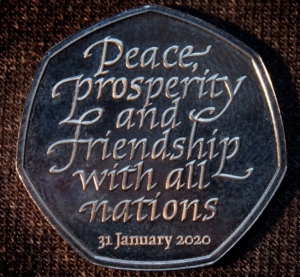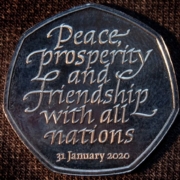Peace, prosperity and friendship
 A passionate debate has erupted over the grammar of the wording on the new 50 pence ‘Brexit coin’ due for release by the Royal Mint on Friday, January 31 2020. It was prompted by a tweet from high-profile author Philip Pullman last Sunday:
A passionate debate has erupted over the grammar of the wording on the new 50 pence ‘Brexit coin’ due for release by the Royal Mint on Friday, January 31 2020. It was prompted by a tweet from high-profile author Philip Pullman last Sunday:
“The ‘Brexit’ 50p coin is missing an Oxford comma, and should be boycotted by all literate people,” he said. Readers who are unfamiliar with the Oxford comma can read the Wikipedia entry here. It makes interesting reading in any case, and has been known to contribute to translation headaches.
Technically speaking, Roslyn Petelin, designer and convenor of the Massive Open Online Course (MOOC) WRITE101x – English Grammar and Style at The University of Queensland, has a point when she says Philip Pullman’s Oxford comma ‘rage’ doesn’t go far enough to sort out the problem with the quote, as explained in The Conversation here.
Incidentally, one can’t help wondering why the Oxford comma pontificators didn’t make a fuss before? After all, there was plenty of opportunity, bearing in mind that, long before the previous coin batch with the premature October 2019 date was melted down, a technical prototype batch with the even more premature March 2019 date had to be melted down – see here.
That said, presumably one wouldn’t be too surprised if it turned out that the coin designers were of a ‘closed disposition’ – for explanation see the relatively optimistic assessment of the Brexit situation by Stephen Bush (New Statesman) here – and may have chosen the wording deliberately (or at least subconsciously) to indicate that peace, and in particular prosperity, are mainly intended for the UK, in the spirit of making Britain great again. In which case Roslyn Petelin’s questions: Does “Peace with all nations” make grammatical sense? and Does “Prosperity with all nations” make grammatical sense? would be a red herring.
Except that, according to Wikipedia, the UK is an exceptional case and an unusual example of a nation state, in that it has been described as a “multinational state”, consisting of four nations, i.e. England, Northern Ireland, Scotland and Wales. Oh dear – back to the grammatical / linguistic drawing board? No wonder Her Majesty is not amused!
Perhaps all this fuss about the ‘Brexit coin’ grammar could have been avoided by using the simplified – and eminently unobjectionable – version of the motto shown below. Simples!




